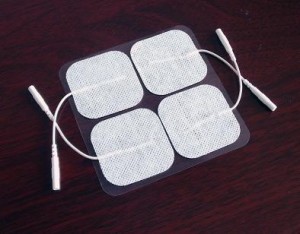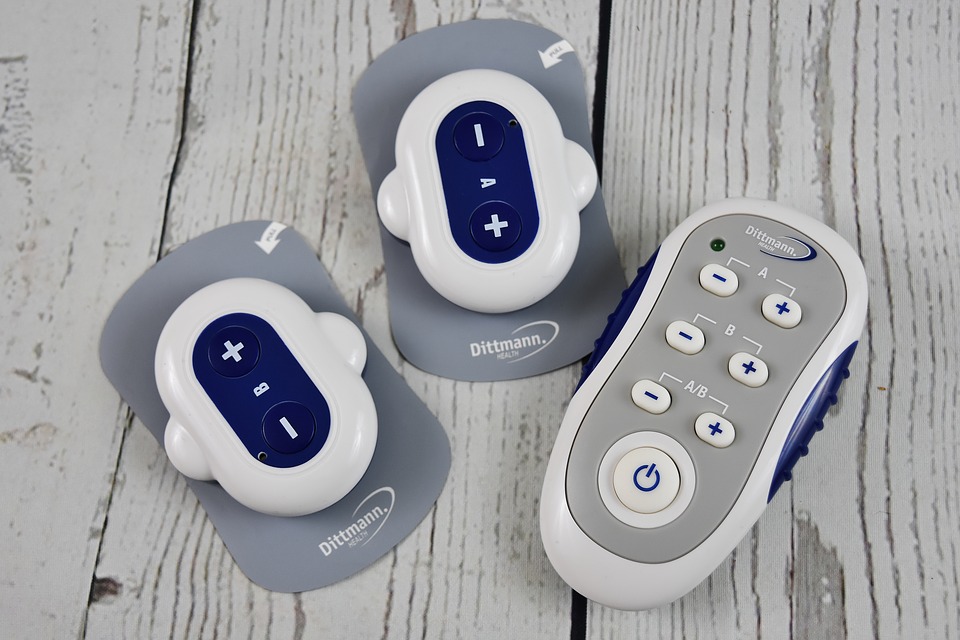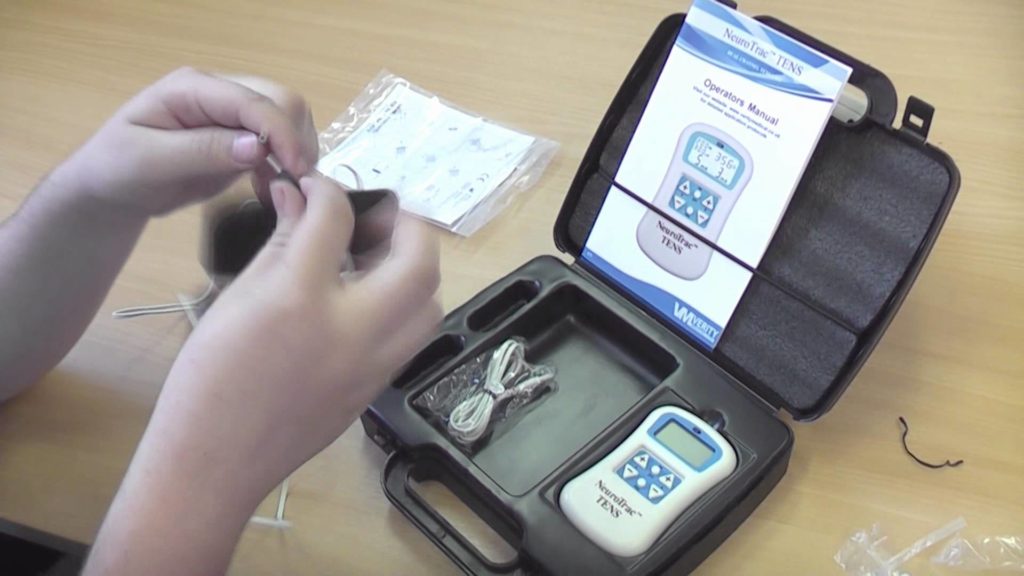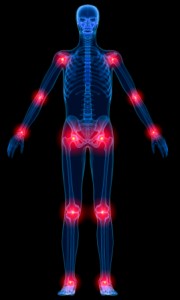For more on TENS machines and how our readers use them why not go here.
TENS machines
TENS machines – what everyone suffering from a pain condition needs to know
Introduction
Transcutaneous electrical nerve stimulation (TENS) is a method of pain relief involving the use of a mild electrical current.
A TENS machine is a small, battery-operated device that has leads connected to sticky pads called electrodes.
You attach the pads directly to your skin. When the machine is switched on, small electrical impulses are delivered to the affected area of your body, which you feel as a tingling sensation.
The electrical impulses can reduce the pain signals going to the spinal cord and brain, which may help relieve pain and relax muscles. They may also stimulate the production of endorphins, which are the body’s natural painkillers.
What TENS is used for
TENS may be able to help reduce pain and muscle spasms caused by a wide range of conditions including:
It’s also sometimes used as a method of pain relief during labour.
Does TENS work?
There isn’t enough good-quality scientific evidence to say for sure whether TENS is a reliable method of pain relief. More research is needed and clinical trials for TENS are ongoing.
Healthcare professionals have reported that it seems to help some people, although how well it works depends on the individual and the condition being treated.
TENS isn’t a cure for pain and often only provides short-term relief while the TENS machine is being used.
However, the treatment is generally very safe and you may feel it’s worth trying instead of, or in addition to, the usual medical treatments.
Trying TENS
If you’re thinking about trying TENS, it’s a good idea to speak to your GP about a referral to a physiotherapist or pain clinic.
A physiotherapist or pain specialist may be able to loan you a TENS machine for a short period if they think it could help.
You can choose to buy your own TENS machine without getting medical advice, but it’s generally better to have a proper assessment first, so you can find out whether a TENS machine is appropriate for you and be taught how to use it properly.
To get the most benefit from TENS, it’s important that the settings are adjusted correctly for you and your individual condition.
If you find TENS effective, you can buy a TENS machine from a pharmacy. They range in price from about £10 to £200. More expensive machines aren’t necessarily any better than lower-priced ones, so it’s best to do some research before you buy.
How to use TENS
The information below is a general guide on how to use a TENS machine. You should always follow the manufacturer’s specific instructions.
TENS machines are small and lightweight, so you can use them while you’re working or on the move. You can put it in your pocket, clip it to your belt or hold it in your hand.
You can use TENS throughout the day for as long as you like, although it shouldn’t be used while you’re driving, operating machinery, or in the bath or shower.
Positioning the pads
Make sure the machine is switched off before you attach the pads to your skin. Position the pads either side of the painful area, at least 2.5cm (1 inch) apart.
Never place the pads over:
- the front or sides of your neck
- your temples
- your mouth or eyes
- your chest and upper back at the same time
- irritated, infected or broken skin
- varicose veins
- numb areas
Turning it on and adjusting the strength
Turn on the TENS machine when the pads are attached in the correct places. You’ll feel a slight tingling sensation pass through your skin.
The machine has a dial that allows you to control the strength of the electrical impulses.
Start on a low setting and gradually increase it until the sensation feels strong but comfortable. If the tingling sensation starts to feel painful or uncomfortable, reduce it slightly.
Switch the TENS machine off after you’ve finished using it and remove the electrodes from your skin.
Are there any risks of side effects?
For most people, TENS is a safe treatment with no side effects.
Some people may be allergic to the pads and their skin may become red and irritated, but special pads for people with allergies are available.
TENS isn’t safe for everyone to use. Don’t use it without first seeking medical advice if:
Pain Management – what treatments do you take (or have taken) for pain?
Since the earliest days of Patient Talk we have always been interested in how our readers manage their pain.
With many of our readers having multiple sclerosis, rheumatoid arthritis, fibromyalgia and diabetes in particular the whole area of pain management is an important part of our mission as a blog.
So when one of our readers asked us “What treatments do your readers take for pain?” we thought that this would be an excellent opportunity to find out.
So that is the purpose of the poll below.
But we would also like to take the discussion a little bit further. While we have looked generally at pain management in the past today we want to do something a bit different.
Once you have taken part in the poll (for which many thanks) it would be very grateful if you could tell us a bit more in the comments section below. In particular could you rate the treatments in terms of your own pain outcomes. A bit like this blog on TENS machines and pain.
Many thanks in advance and we are confident your comments will be of great help to others on their pain journey.
| CindyJones1 | We should be able to choose more than one. I do take medication but I also have a spinal cord stimulator, my trusty heating pad. PT exercises and therapeutic exercises given to me by my therapist. I had to get one due to my adhesive arachnoiditis, she has given me a lot of tools. |
| patienttalk patienttalk.org |
MancFlickChick Great tip – many thanks |
| MancFlickChick | When my fingers felt like they were being stabbed by thousands of tiny knifes (this doesn’t happen with everyone) the only thing that did any good was to put them in cold water which worked instantly, much better than the incredibly strong pain killers the ER staff gave me which did nothing. |
Fibromyalgia and household gadgets – What household gadget have you found useful since you were diagnosed with fibro?
In my previous job we explored this is quite a bit of detail. A few years on i thought it would be interesting to see if this was still true today and what household gadgets and devices people with fibromyalgia found of use in dealing with the condition!
To do so I thought it would be interesting to poll the members of our Facebook discussion page FibromyagiaTalk. So a week or so ago we asked the question “Do you have a household gadget which ask provided you with particular help since your first symptoms of fibro?”
I have to say the results were fascinating as you would expect!
One item mentioned by a lot of responders was electric blankets. Indeed Pamela shared “Electric blanket has gotten me out of many binds. Also electric fireplace – I sleep on a dog bed all wrapped in blankets.” She goes on to mention “Drinking vanilla protein powder in ice water has fixed my binging on carbs which always brought on symptoms. Also it takes the place of iced tea or diet coke, which also did bc of caffeine. Dole fruit in 100% juice replaced the candy I was using to stay awake and functioning. Pushing past whatever physical, mental or emotional limits I think fibro sets for me has been my best gadget tho prayers to everyone struggling with it”
Aids to keeping warm are also mentioned in particular both Heather and Marsha mentioned heating pads. TENS machines also got mentioned by Kate.
Wendy commented ” “Walking stick, raised toilet seat, jar and bottle openers, electric can opener, back scratcher, shoe horn, safety handle on my bed to help with lying down and sitting up! Tubigrip and joint supports for my feet/ankles, knees, wrists and elbows! “. All great ideas.
Lesley said “I have a hot water dispenser instead of a kettle it makes things easier x”.
While Paula told us “Scissors..of course that might be helpful with all the arthritis I have also. I keep them everywhere”.
And Su offered “Grab rails in the bathroom over bath and in shower”.
Other however took a different approach. Sue-Ann said ” Although it’s probably not a household gadget, I will share that I play guitar. The nylon strings don’t sound like the steel that I love. I have found silk coated strings made by D’Addario. So for all u string instrument players suffering with fibromyalgia who love ur steel string sound….these give u the sound u love w/o the stress on ur fingers. ” And Debbie said “I love to sing and I mostly sing gospel music. It helps a lot and my gadget is my electric throw and my husband is awesome he takes care of me when I have a flare”.
The final comment I would like to mention is from Shay who gave us this plea: “I would like to start a campaign to ask vacuum manufacturers like Dyson to make the height of the handles adjustable so that particularly tall people like myself don’t have to stoop all the time while using them. This post is kind of the opposite of the question asked. My vacuum is the instrument that most frequently causes me extreme pain since the onset of #fibro. ”
So over to to you. What would you add to this list?
Feel free to add you thoughts and ideas in the comments section below.
Many thanks in advance!
Treating Pain with a TENS Machine
A few weeks ago we ran a very successful blog on pain management. One of the threads was about using TENS machine to help treat pain. To read more of the blog please go to https://patienttalk.org/?p=225.
about using TENS machine to help treat pain. To read more of the blog please go to https://patienttalk.org/?p=225.
One of the big discussions was the use of TENS machine to treat pain. With one reader saying
“I had a friend that let me try his tens unit just when my nerve pain was starting. Within 5 minutes of using the tens unit my pain was gone. I then saw a PT Dr. who said the tens unit helps a whole bunch of patients. It is worth a shot, they are not that expansive and is better than medicine.”
On the other hand another reader recounted “no it does its makes it worst i use it to the tens unit and it doesnt do anything for my pain.”
So it seems that experiences are pretty divided. Because of these we thought it would be interesting to focus on the use of TENS machines to treat pain. We would love it if you could tell us about your experience of using TENS machines in the comments box below.
But what actually is a TENS machine and how does it work? Well TENs machines, or to give then their full name Transcutaneous electrical nerve stimulation machines use of electrical current to reduce pain. Typically the current is applied by two or more electrodes on the skin.
Have you ever used a TENS machine? How effective did you find it?
It would be great if you could share your knowledge with other readers of the blog. To help you frame your contribution you might wish to consider the following questions:-
a) What is your main medical condition which caused you pain?
b) Have you ever tried a TENS machine?
c) How effective was the TENS machine compared to other treatments?
d) How did you use the TENS machine? For how long and where on your skin for example?
e) How did you obtain the TENS machine? Is there any machine you would recommend?
Obviously these are just guidelines so please share anything you think may be of interest or useful to other readers in the comments box below.
Many thanks in advance for your contributions to the blog!



